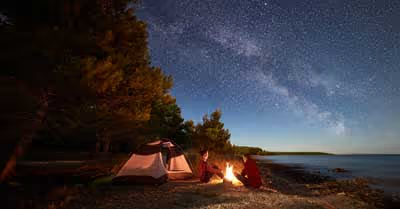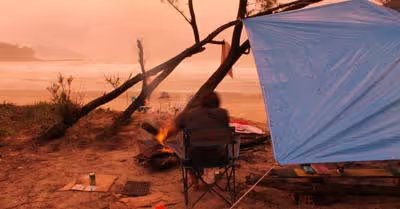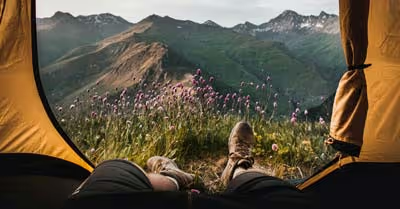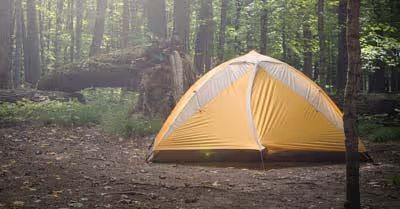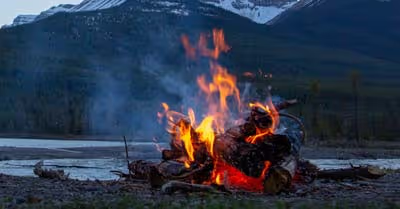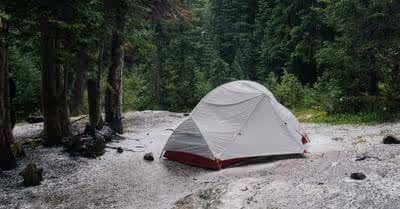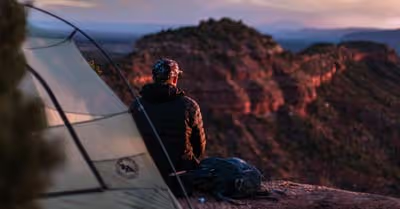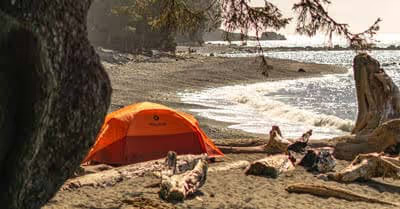Table of Contents
Can I Pitch a Tent Anywhere?
Sadly, the fact of the matter is that the average citizen isn't free to pitch a tent wherever they go. However, once they're made aware of the rules and limitations, there are plenty of wide, open spaces where campers can find unique and spacious camping spots away from the general public, allowing them to get in touch with nature. For those who are curious, this article will show you the best ways to find spacious and open campsites that are off the beaten path, making you feel like a true outdoorsman.
Off-the-Grid Camping Is Fun and Rewarding
As survival camping and other more back-to-basics outdoor activities have grown in popularity, the desire to find camping spots off the beaten path has, as well. There are many reasons that a camper may want to find a camping spot that is more secluded. For one thing, a secluded camping spot offers the camper a much more personal one-on-one experience with the natural world.
Backpackers, Hikers, and Road Trippers
Even beyond personal preference, there are many situations where a camper may want to set up a site in a location that isn't set-up like a basic campsite for the general public. These can include if you're a backpacker or a hiker on a multi-day trek looking for a rest, or if you're a road tripper who simply needs a place to pull over for the night. While campers aren't simply free to pitch their tents wherever they happen to fall, there are many options that will allow campers the freedom to pitch a tent in a location that isn't already established as a public camp spot.
Freedom In the Outdoor World
It's a sad and counter-intuitive fact of life that if you want to get the most out of the outdoors, you have to have a thorough understanding of man-made rules and regulations. Unless you want to get kicked out your camp spot by some pesky authorities or, even worse, receive a gigantic fee for camping in an area that prohibits it, knowing the rules is, ironically, your key to freedom in the outdoor world. While these rules may seem hard to follow to laymen, they aren't actually all the complicated, and knowing them will give you the true freedom that you desire when you're out trying to find a campsite.
Where Can I Pitch a Tent?
National Grasslands
For campers in the USA, there is a general rule of thumb that says that campers are allowed to pitch a tent anywhere within the borders of established national grasslands. While this may seem restricting, national grasslands account for millions of acres of land across the nation, giving campers a vast amount of land that they can feel free to camp in at their leisure. This land includes many areas throughout the Rocky Mountains, as well as many prime locations along the West Coast.
National Forests
Besides the vast national grasslands, campers are also typically free to pitch a tent wherever they should wish within the boundaries of national forests. While some national forests may require an easy-to-acquire permit before setting up a campsite, that's never too much of an issue, and that simple permit will give you nearly universal permission to set up your own personal camping spot in an exceptionally vast array of open land. As with national grasslands, national forests entails a gigantic amount of land all across the country.
National Parks
Nationals parks can also oftentimes offer campers a place to camp, although their rules and regulations are generally a good deal more limited than those of national grasslands or national forests. For the most part, camping in national parks is relegated specifically to developed campsites and, even then, not all national parks have designated campsites you can camp in. Even those that do offer camping will typically charge a fee, so the camping won't be free, and you won't be free to do whatever you want when you're there.
National Parks Typically Offer Amenities
The good thing about camping at national parks, though, is that many of the developed campsites will feature the more traditional amenities and hook-ups that more established camping spots are known for. While these amenities certainly have their benefits, they won't pose much of an attraction to those who are looking at camping specifically as an escape from nature, or those who prefer survival modes of camping. While not all national parks campgrounds offer such things as running water and electricity, a good deal of them do, and, for certain campers, this may make camping in a national park more attractive of an option than camping in national grasslands or national forests.
Backcountry Camping In National Parks
For backpackers and hikers, backcountry camping allows you to set up a camping spot overnight with limited amenities. Many national parks will have established backcountry campgrounds for such occasions, while other national parks will allow backcountry campers to set up campsites on their own volition, so long as your camping isn't too obtrusive to the natural world. If you plan on going backcountry camping, be sure to make a plan and check beforehand in order to find a national park that allows you to do the kind of camping that you'll require.
Other Options for Emergency Sleeping:
Truck Stops
One of the main reasons that people may wish to have the freedom to pitch a tent wherever they go is that they don't know where they're going to end by the time they want to sleep. For those road trippers who don't know where they're going to land on the map come nightfall, truck stops and rest stops may be a more viable option than trying to find a lot of land that will allow you to pitch a tent without planning in advance. There are many truck stops and rest stops around the country that will allow you to park and sleep in your car, and that may be all the rest you require to get back on the road come morning.
Parking at Walmart
Besides truck stops and rest stops, many Walmarts across the country allow for overnight parking. Whether you're in a car, truck, or RV, most Walmarts will let you park overnight and get the rest you require to be on your way by morning. Just keep in mind that Walmart won't typically offer your electrical or water hook-ups, and you'll generally expect to be on your way by the next day.
Knowing the Rules Gives You Freedom
The fact of the matter is that it's hard to make any generalizations about any lot of land, so it's always best to try and be proactive when figuring out the specific rules and regulations of the areas you wish to camp in. Rules can change from land to land, but also can change in the same lot of land at different points of the year, or day. What's okay in one place won't be okay in another, and might not be okay at different times.
Plan Your Trip In Advance Whenever Possible
For this reason, you should always try to plan your trip out in advance and make yourself aware of both the camping grounds and their specific regulations in the general vicinity of the area you are going to be in. Doing this can give you all the preparedness you'll need in case things go awry, and will also make you that much more ready for any spontaneous changes in plans should you wish to follow you campers' intuition.
Off-the-Grid Camping Means No Amenities, So Be Prepared!
It's always important to keep in mind that if you're looking to go camping off-the-grid, you're not going to be able to access the same amenities that traditional campers may be reliant on. You won't have water and electrical hook-ups, and you're going to be hard-pressed to find a public restroom with compostable toilet paper. While survivalist campers should already be well aware of this reality, road trippers and beginning backpackers should do their best to read up on survival camping before trying to venture out into the wilderness with little to no resources.
Leave the Land the Way You Found It!
It's also important to remember that all land should be treated respectfully, whether it's been established as a camping ground or not. When you're camping off-the-grid, you aren't going to be able to find trash cans, and you're going to have to make sure that you take care of any and all trash on your own so as not to disturb the delicate balance of the natural world. Camping is a means to get in touch with nature, after all, and what's the point of getting in touch with nature if you're simply going to leave it worse off than you found it!
Recent Articles



